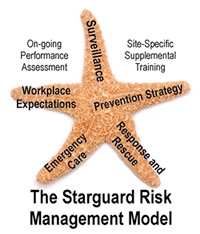Sweetwater Pools is heavily invested in each employees success. We train and manage our lifeguards by
offering a world-class training program called StarGuard. In our unique lifeguard program, you’ll learn
strategies for maintaining vigilance and providing surveillance in the aquatic environment. You’ll also learn how to recognize, respond and provide emergency care, in-addition to CPR for the professional rescuer, AED, blood-borne pathogen procedures, and delivering First Aid. Finally, you’ll learn best practices or maximizing professionalism and personal safety.
Starguard Lifeguard Course Information:
- Candidates must pay the appropriate course tuition fee prior to the beginning of the class. (Course fees are non-refundable.)
- All candidates must pass a prerequisite skill test to continue in the training class. This skill test consists of: swimming 100 yards using any type of stroke except the backstroke; treading water for 1-minute using only your legs; and retrieving a 10lb. object from eight (12) feet of water.
- Candidates must be 15 years of age or older and attend all sessions.
- Candidates must score 80% or better on a written exam, pass a technical performance and simulation
practical exam. - Candidates must pass each of the five Starguard® safety training and aquatic rescues which include
prevention, surveillance, managing a conscious victim, managing an unconscious victim, and professionalism and personal safety. - Starguard® certification is valid for one (1) year.
Starguard Program:
- Prevention Strategy: This includes all the behind the scenes components in place to reduce the risk of patrons drowning or becoming ill or injured.
- Surveillance: Watching patrons, monitoring their behavior, and recognizing emergencies play a large role in reducing risk.
- Response and Rescue: You must understand what needs to be accomplished and use best practices to respond to and manage and emergency.
- Emergency Care: When illness, injury or drowning occurs, you must have a plan and be prepared to provide emergency care.
- Workplace expectations: Site-specific training, supervision and culture at your workplace play a significant role in your future performance and ability to follow best practices.






